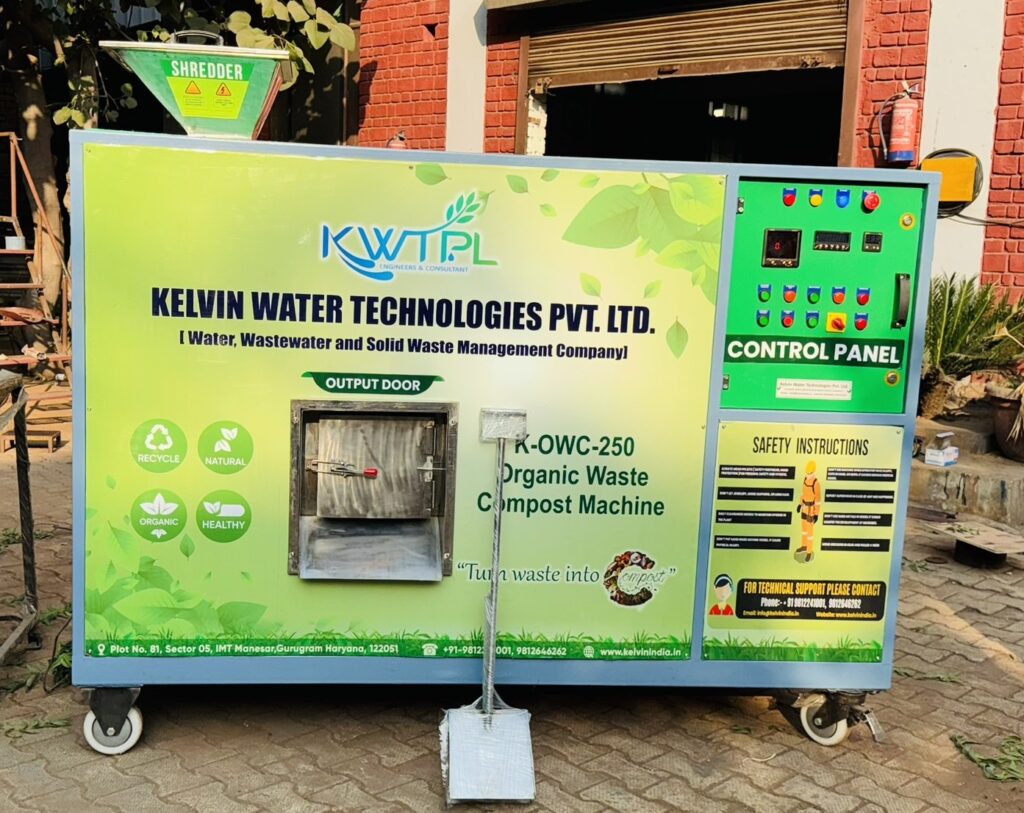With growing awareness of environmental sustainability and the urgent need to reduce landfill waste, organic waste composting has emerged as an essential practice for households, institutions, and industries. Organic waste, which includes kitchen scraps, garden waste, and food residues, can be efficiently converted into nutrient-rich compost through modern composting solutions. Kelvin Water Technologies, a leading provider of waste management equipment in India, offers advanced organic waste composters that are efficient, hygienic, and environmentally friendly.
What is an Organic Waste Composter?
An Organic Waste Composter is a machine or system designed to convert biodegradable organic waste into compost through controlled biological decomposition. Unlike traditional composting methods that take months, modern composters are faster, odor-free, and require minimal manual intervention. These composters can handle:
- Kitchen waste (vegetable peels, fruit scraps, leftover food)
- Garden waste (leaves, grass clippings, small branches)
- Biodegradable industrial waste (from food processing units, hotels, and restaurants)
Importance of Organic Waste Composters
Composting organic waste is critical for several reasons:
- Environmental Protection: Diverts waste from landfills, reducing methane emissions and soil contamination.
- Resource Recovery: Converts waste into compost, a natural fertilizer that enriches soil fertility.
- Cost Savings: Reduces dependence on municipal waste collection and chemical fertilizers.
- Regulatory Compliance: Helps institutions and industries comply with municipal solid waste management rules.
- Hygiene & Odor Control: Modern composters process waste in a sealed, controlled environment, minimizing pests and foul smells.
Types of Organic Waste Composters
Organic waste composters can be categorized based on capacity, processing method, and application:
- Domestic/Small-scale Composters
- Capacity: 5–50 kg/day
- Application: Homes, small apartments, and offices
- Features: Compact design, simple operation, minimal maintenance
- Benefit: Converts household kitchen and garden waste into compost for home gardening
- Commercial/Institutional Composters
- Capacity: 50–500 kg/day
- Application: Hotels, restaurants, schools, hospitals, and residential complexes
- Features: Faster composting, automated aeration, temperature control, and odor management
- Benefit: Reduces waste disposal costs and produces compost usable for landscaping or horticulture
- Industrial/High-capacity Composters
- Capacity: 500 kg–5 tonnes/day
- Application: Food processing units, large commercial kitchens, municipal markets, and institutional campuses
- Features: Fully automatic operation, shredding, mixing, temperature and moisture control, and continuous composting
- Benefit: Handles large volumes of organic waste efficiently and produces high-quality compost for agriculture or commercial sale
- In-vessel Composters
- Method: Composting occurs in a sealed vessel or drum
- Features: Odor-free, controlled aeration, faster processing
- Application: Hotels, hospitals, and large residential complexes
- Benefit: Hygienic and suitable for areas where open composting is not feasible
How an Organic Waste Composter Works?
The process of composting organic waste in modern machines typically involves the following steps:
- Collection and Segregation: Organic waste is collected separately from inorganic waste. Proper segregation ensures smooth composting and reduces contamination.
- Shredding: Large organic materials such as vegetable peels, branches, or food scraps are shredded to increase surface area for faster decomposition.
- Loading: Waste is loaded into the composter. For industrial units, conveyors or hoppers are often used.
- Aeration and Mixing: The composter ensures proper oxygen supply and mixing to maintain microbial activity.
- Temperature and Moisture Control: Sensors monitor the composting environment to maintain optimal conditions for microbial degradation.
- Decomposition: Microorganisms break down the organic matter into humus-rich compost over a controlled period (24–72 hours for advanced units, up to 21 days for slower systems).
- Collection of Compost: The final compost is collected, ready for use as a fertilizer or soil conditioner.
Benefits of Kelvin Water Technologies’ Organic Waste Composter
- High Efficiency: Capable of processing large volumes of organic waste quickly and consistently.
- Odor-Free Operation: Sealed composting systems with advanced aeration prevent foul smells and pest problems.
- Hygienic and Safe: Reduces exposure to pathogens and ensures safe handling of organic waste.
- Cost-Effective: Low energy consumption and reduced reliance on external waste disposal services.
- Sustainability: Converts waste into organic compost, supporting eco-friendly landscaping, agriculture, and green initiatives.
- Customizable Solutions: Available in multiple capacities to suit residential, commercial, and industrial requirements.
- Automation & Monitoring: Advanced sensors and PLC systems ensure optimal composting conditions, reducing operational workload.
Applications of Organic Waste Composters
- Residential Complexes: Process daily kitchen and garden waste, creating compost for gardening or landscaping.
- Hotels & Restaurants: Manage large quantities of food waste while maintaining hygiene standards.
- Institutions & Hospitals: Safely handle biodegradable waste, ensuring compliance with municipal regulations.
- Municipal Markets: Process vegetable and fruit waste to reduce disposal costs and improve cleanliness.
- Industrial Food Units: Treat waste from processing and manufacturing while producing compost for agriculture.
Why Choose Kelvin Water Technologies
Kelvin Water Technologies stands out as a trusted provider of organic waste management solutions because:
- Experience: Years of expertise in designing and manufacturing composters for varied applications.
- Custom Solutions: Machines tailored to site-specific waste characteristics and volume.
- Automation & Efficiency: Advanced control systems for optimum composting conditions.
- Eco-Friendly Practices: Focus on reducing landfill load and converting waste into valuable resources.
- After-Sales Support: Installation, training, and maintenance services ensure smooth operations.
Conclusion
Organic waste management is no longer a choice but a necessity for households, institutions, and industries committed to sustainability. Advanced organic waste composters provide an effective solution to convert biodegradable waste into valuable compost, reducing environmental impact and supporting circular economy practices. Kelvin Water Technologies offers reliable, efficient, and scalable composting solutions that help clients manage waste responsibly, comply with regulations, and contribute to a greener planet.



